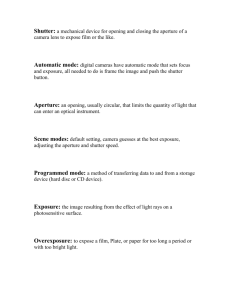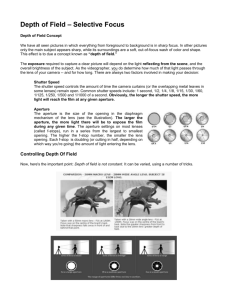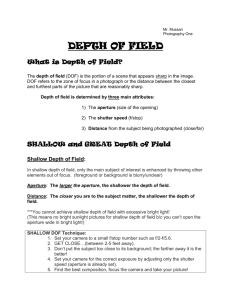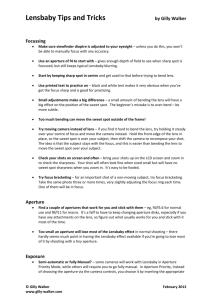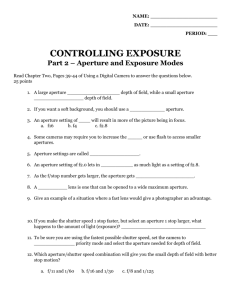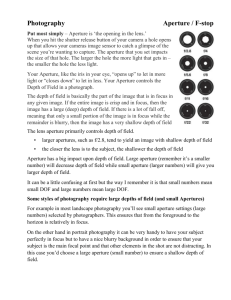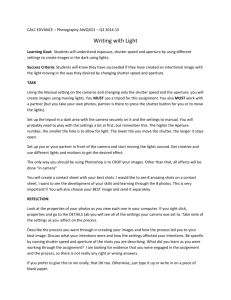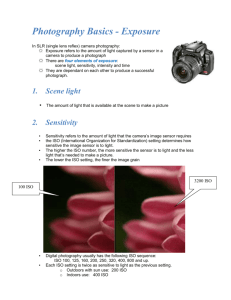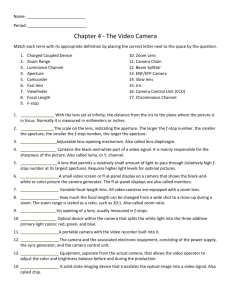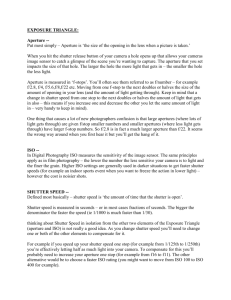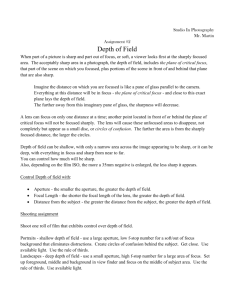Depth of Field - Powerpoint
advertisement
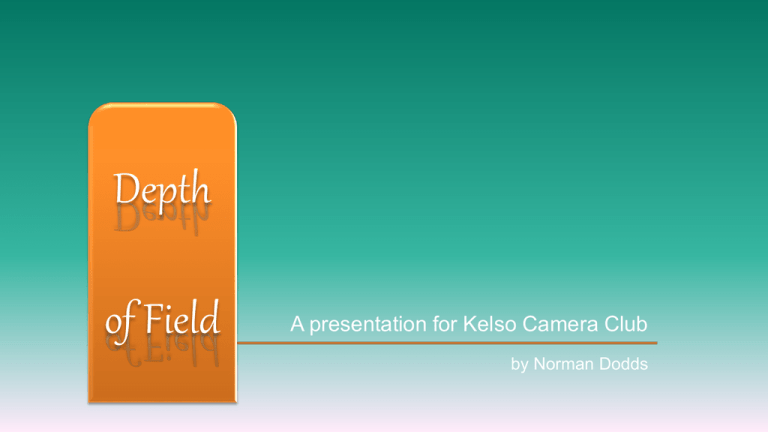
Depth of Field A presentation for Kelso Camera Club by Norman Dodds What is depth of field? • Depth of Field is the amount of a photograph which is in acceptably sharp focus from the foreground to the background Why is it useful to understand depth of field? • It allows a photographer to control the amount of the photograph which is in sharp focus to enhance the effectiveness of the image Everything in focus Main subject in focus – background blurred but recognisable Main subject in focus – background totally blurred What influences depth of field? • The focal length of your lens: wide angle lens = more depth of field telephoto = less depth of field • The distance from the subject: further away = more depth of field closer = less depth of field • The aperture of your lens Aperture • Aperture is the opening in your lens which lets in light reflecting from your subject • Aperture is measured in f stops. Typically lenses will have apertures from f2 to f36 • Just to confuse, large apertures have small numbers and small apertures have big numbers! Aperture • Each aperture allows in half or double the amount of light as you move up or down the f stops • Your camera may also be able to move up and down the scale in smaller steps with 2 or 3 positions between the ‘official’ f stops • Aperture has a significant impact on depth of field: A large aperture will give a small depth of field A small aperture will give a greater depth of field Why does aperture affect depth of field? • The explanation is a little bit technical: The non-technical explanation is simpler - it just DOES! That works for me! F 5.6 1/3200 small depth of field F 11 1/1000 medium depth of field F 36 1/80 large depth of field How do you work out what the DoF will be? • There are 5 possibilities: Ignore it – don’t worry…. be happy! Use the depth of field preview if your camera has one. This provides you with a visual check Use the depth of field scale if your camera has one How do you work out what the DoF will be? • There are 5 possibilities: Ignore it – don’t worry…. be happy! Use the depth of field preview if your camera has one. This provides you with a visual check Use the depth of field scale if your camera has one Use a depth of field calculator Get this online How do you work out what the DoF will be? • There are 5 possibilities: Ignore it – don’t worry…. be happy! Use the depth of field preview if your camera has one. This provides you with a visual check Use the depth of field scale if your camera has one Use a depth of field calculator Make an educated guess! Hyperfocal Distance and Focussing • The hyperfocal distance is the closest distance at which a lens can be focused while keeping objects at infinity acceptably sharp. • When the lens is focused at this distance, all objects at distances from half of the hyperfocal distance to infinity will be acceptably sharp. Hyperfocal Distance and Focussing • There are three ways to set your focus to the hyperfocal distance: Use the scale on your lens – if you have one! Hyperfocal Distance and Focussing • There are three ways to set your focus to the hyperfocal distance: Use the scale on your lens – if you have one! Use a chart Get this online Hyperfocal Distance and Focussing • There are three ways to set your focus to the hyperfocal distance: Use the scale on your lens – if you have one! Use a chart Guess! Using depth of field • • • • • • • Set your camera mode to AV - Aperture Value Choose your subject and compose your shot Set your chosen aperture If you have a depth of field preview, use that to check the DoF Check your shutter speed If it’s fast enough – take the picture If it’s too slow: Use a tripod ……. OR Increase the ISO until the shutter speed is acceptable Shutter Speed • Shutter speed determines the amount of time the lens remains open when you press the button • Similar to aperture, shutter speeds double or halve the amount of time the lens is open as you click through the different speeds • A photograph’s exposure is set by a combination of shutter speed and aperture • Shutter speed has no impact on depth of field Finding out more • Google ‘depth of field’ • Dofmaster website Questions?
